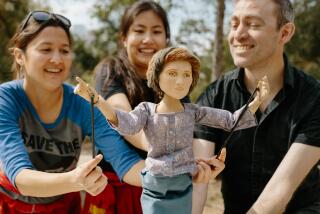Puppet Master Pulls Strings to Keep Craft Alive
- Share via
HONG KONG — Yeung Ching-yee lifts four strings between two chubby fingers, and an ancient Chinese lady half his height springs to life.
Clad in a pink embroidered dress with blue collars, the figure turns her head demurely as she lifts her right elbow, revealing elegant fingers beneath long white sleeves. A second later, she gracefully sways and walks in small steps.
Yeung’s dexterous manipulation makes puppetry look easy. It isn’t.
“This is so complicated!” exclaim several of his students, struggling with the strings of their own puppets.
Yeung had to flee Mao Tse-Tung’s Cultural Revolution in mainland China to practice his life’s calling. Now he’s one of the last puppet masters in Hong Kong who have watched their once-popular art decline in the era of discos, television, movies and computer games.
Yeung says he runs the territory’s only remaining Chinese marionette troupe -- the Hong Kong Sky Bird Puppet Art Group.
Hoping to raise appreciation of the art before it’s too late, last year he published a 536-page book on traditional puppet plays, and for several years he’s been teaching classes in puppetry.
When Yeung, 53, grew up in the coastal city of Quanzhou, home to China’s best puppet troupes, the art seemed to have a bright future.
At age 13, he embarked on a five-year apprenticeship, dreaming that one day he, like other veteran puppeteers, would be able to travel outside China to perform overseas.
Yeung says a vivid imagination is even more important than physical skill in nimbly manipulating a puppet’s strings to make it look lifelike.
“You have to get inside the head of the characters and imagine how exactly they’ll move to express their emotions,” he said.
Each puppet has at least 17 strings to move limbs and other parts of the bodies. Some have more than 30. “It’s not easy,” Yeung said.
Puppet art in China originated in the Han dynasty, which ruled from 206 B.C. to A.D. 220. The shows usually feature swordsmanship or historical stories.
Quanzhou’s puppet masters are renowned for crisp singing voices as well as creating marionettes with meticulously carved heads and delicate, colorful costumes -- strongly reminiscent of traditional Chinese opera.
Yeung says he once had a powerful singing voice that could carry the show, but he lost much of it in middle age. Now, he uses tape recordings during his performances.
As a young puppeteer, he was in the right place but in the wrong time. The Cultural Revolution began in 1966, just as his apprenticeship was ending, and militant young people organized as Red Guards set out to destroy old customs, arts and culture.
Yeung was sent to work on farms and forced to abandon his beloved craft. He escaped in 1974 and settled in Hong Kong, then a British colony.
Puppet shows were a popular form of entertainment in the territory in the 1970s. Yeung was good enough to make a living at it back then, but by the 1980s, interest began to fade and he could no longer scrape by on puppet shows alone.
He took a full-time job as a civil servant, leaving his puppet performances to his leisure time. He also began teaching puppet courses and is still at it after retiring from the government.
His classes attract all types: Young and old, Chinese opera lovers, even a French-Chinese who plays African drums.
“I’m so lucky because it’s very difficult to find a good puppet master and I’ve found one,” said the 21-year-old drummer, Chou Min-wan, who’s undeterred by being unable to understand Cantonese. He must rely on fellow classmates to translate Yeung’s words.
Chou says he’s been mesmerized by Chinese marionettes ever since he saw a mainland troupe perform in France, so he enrolled in Yeung’s class after arriving in Hong Kong in June for an extended visit.
Chou’s musical background may help. He is able to walk his puppet more fluidly than some of the other students.
“It’s difficult learning to coordinate all a puppet’s movements smoothly,” said Sandy Hui, a 25-year-old accountant, amateur dancer and actress.
Still, she enjoys puppetry because it’s a unique genre of performing art that combines Chinese history, operas, masks and embroidery.
“It’s special because you express yourself through your fingers and not your body,” Hui said.
Yeung’s wife, Choi Ling-ling, helps teach the course. She says most students quit because of the difficulty. “It takes a lot to achieve mastery,” she said.
More to Read
Sign up for Essential California
The most important California stories and recommendations in your inbox every morning.
You may occasionally receive promotional content from the Los Angeles Times.













